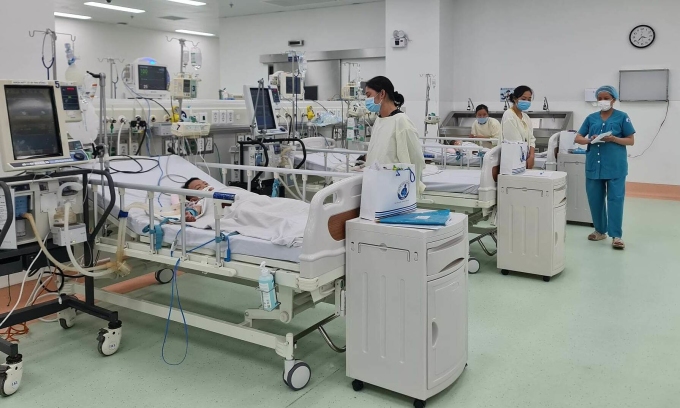In Ho Chi Minh City, Children's Hospital 1 has recently admitted more than 10 children with severe hand, foot, and mouth disease requiring mechanical ventilation, whereas two weeks prior there were no cases requiring intensive care.
Associate Professor, Dr. Pham Van Quang, Head of the Intensive Care and Toxicology Department at Children's Hospital 1, said: "For the past two weeks, there has been a continuous stream of critical cases admitted to the department, and the number of severe cases is increasing." On June 21st alone, the hospital received five consecutive very severe cases of hand, foot, and mouth disease, all being treated in the Intensive Care and Toxicology Department. In addition, more than 60 children with less severe cases are being treated in the Infectious Diseases - Neurology Department.
In critical cases, such as respiratory arrest, doctors must combine multiple measures to save the child's life. For example, a 14-month-old girl was admitted to the hospital a week ago. For the first three days, she had a mild fever, a rash on her hands and feet, and a throat ulcer. Afterward, her fever subsided, but she still started startling in her sleep. On the fifth day, she started jerking and thrashing around in her sleep. Her family rushed her to the hospital, but her condition rapidly deteriorated, leading to respiratory failure. She stopped breathing, and doctors intubated her and transferred her to the intensive care unit for mechanical ventilation. However, she experienced cardiovascular collapse, rapid pulse, and hypotension, threatening her life. Doctors had to administer vasopressors to support heart function, give intravenous fluids to combat shock, and perform emergency hemodialysis.
Hemodialysis is an effective method that has contributed to saving the lives of many severe cases of hand, foot, and mouth disease. For young children, this method is very difficult due to the difficulty in accessing blood vessels, and the rapid progression of the disease makes it prone to failure. In the case of the child above, after hemodialysis, the condition improved, and the child is now weaned off the ventilator, alert, and without organ damage.
According to Associate Professor Quang, in the past five years since the 2018 outbreak, severe cases of hand, foot, and mouth disease have been very rare. This year, however, the emergence of Enterovirus 71 (EV71), which is characterized by rapid spread and high virulence, has led to an increase in severe cases. The Ho Chi Minh City Department of Health has recorded a nearly 150% increase in hand, foot, and mouth disease cases in the past month, with many severe cases.
Other pediatric hospitals are also seeing an increase in hand, foot, and mouth disease cases, whereas in previous months the average was only 5-6 hospitalized children or none at all. For example, the City Children's Hospital is currently treating over 50 hand, foot, and mouth disease cases, 15% of which are severe. Children's Hospital 2 has over 40 children under treatment, with 20-25% experiencing neurological complications such as seizures and limb weakness.

A child with severe hand, foot, and mouth disease is being treated at the Intensive Care and Toxicology Unit, Children's Hospital 1, on June 22nd. Photo: Le Phuong
Explaining the reason for the rapid increase in hand, foot, and mouth disease this year , Dr. Truong Huu Khanh, Vice President of the Ho Chi Minh City Infectious Diseases Association, noted the reappearance of the EV71 virus but "cannot explain why the dangerous strain has reappeared." However, viral diseases often return in cycles of 3-4 years, especially viruses for which there is no preventive vaccine.
Dr. Khanh also believes that after a long period of the Covid-19 pandemic, children have been indoors for extended periods, leading to weakened immunity against some common annual infectious diseases, making them more susceptible to illness. "Therefore, this hand, foot, and mouth disease outbreak is very worrying," the doctor said.
Another difference this year is that older children are also contracting hand, foot, and mouth disease, whereas previously it was usually seen in children under 3 years old. This means that children who have had the disease before still risk reinfection if they continue to be exposed to the source of infection, according to Mr. Khanh.
Since the beginning of the year, city hospitals have reported 4 deaths due to hand, foot, and mouth disease. Most of the seriously ill children currently under treatment have been transferred from other provinces. The Ho Chi Minh City Department of Health considers this situation worrying because the supply of medicine in the city is limited. In early June, the Department of Health requested assistance from the Drug Administration of Vietnam ( Ministry of Health ) in finding a source of medicine, which is expected to arrive in July. The Department has also prepared three scenarios to respond to the risk of an outbreak.
In this situation, doctors recommend that children with hand, foot, and mouth disease need early diagnosis, close monitoring, and timely treatment. Cases of throat ulcers, rashes, blisters on the palms, soles, buttocks, knees, etc., require medical attention, especially if the child exhibits signs of startling or agitation.
Severe symptoms include persistently high fever that is difficult to bring down, fever lasting more than two days, frequent vomiting, startled reactions, tremors, unsteady gait, cold hands and feet, profuse sweating, lethargy, and difficulty breathing. If your child exhibits these symptoms, they need to be taken to the hospital for emergency treatment immediately.
Preventive measures include sanitizing children's toys and cleaning the house with soap, bleach, or other common disinfectants. Early detection of hand, foot, and mouth disease symptoms in children is crucial for timely isolation and limiting spread.
Le Phuong - My Y
Source link

















































































































Comment (0)